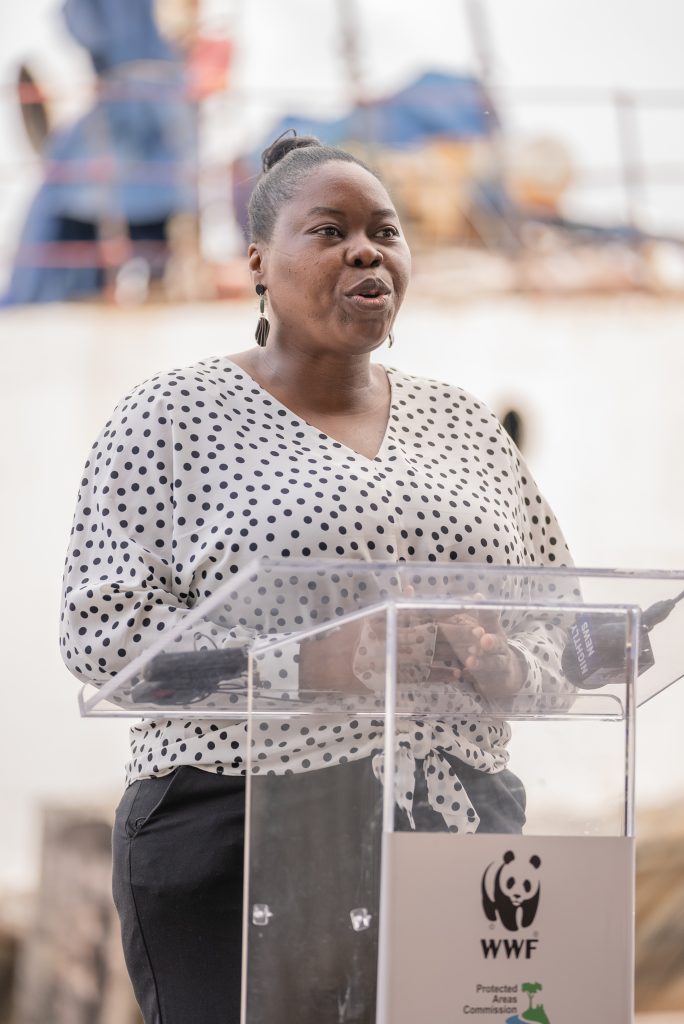
By Vishani Ragobeer
A team of 10 young Guyanese spent six days offshore Guyana identifying the larger animals found there. This was part of efforts to support the protection of the marine environment and to establish certain baselines to assess what impact offshore oil production activity may have on the environment.
Upon the team’s return early Friday morning, Sopheia Edghill, a Conservation Officer at WWF Guianas – Guyana, related that there were numerous interesting species found offshore. These include a pygmy killer whale (which is actually a dolphin), sperm whale, loggerhead turtles and several species of birds.
Since Guyana does not have much information on what species exist in the waters, this research is particularly valuable. But, the team did not engage in this research simply to see and record what animals are found in Guyana’s marine (oceanic) space; they engaged in this research to help inform decision-making on protecting wildlife in Guyana’s marine environment.

“…our ocean is a resource and a lot of food comes from the ocean and maintaining health is very imperative for the future generation,” Maria Fraser, a Marine Biologist, explained.
Similarly, another Biologist Ivana Thompson stated: “The more people know the more they would be able to conserve and protect.”
Even from an economic standpoint, she explained, if people come to Guyana to see these animals offshore as part of local tourism, then in order to sustain that tourism, decisions would have to be made to protect the animals.
PROTECTING THE OCEAN SPACE
Meanwhile, Head of WWF Guianas- Guyana Office Aiesha Williams said the research would support efforts being made to develop a marine spatial plan. This plan is expected to guide decisions on how to use marine resources sustainably.
And, this is particularly important as Guyana moves to expand its Low Carbon Development Strategy (LCDS) to include efforts to protect the country’s marine environment.
“Science is an important aspect of any decision making.

“This expedition project as a whole was meant to gather information (and) this expedition we think will contribute to all the planning that is being done for LCDS,” Williams explained.
This expedition was implemented by the WWF Guianas and the Protected Areas Commission (PAC) through funding from the European Union (EU) Delegation in Guyana.
And the Deputy Commissioner of the PAC Odacy Davis also noted that Guyana has only traditionally focused on protecting the wildlife on land. But the body seeks to focus on marine space and identify what areas in the ocean space should become protected areas too.

“This expedition will really add to the data we do not have. It is time that we start to do more research in our marine zone,” Davis stated.
It is important to note too that WWF Guianas Communications Officer Kemptorne Daly told the News Room that this research was the first baseline study to be done for the animal species in Guyana’s marine environment.
OIL AND GAS DEVELOPMENT
With oil and gas development ongoing offshore this baseline study will help the local conservation authorities to understand and assess what particular impact that economic activity might have on the wildlife.
Davis posits that concerns over the potential impact of that sector are “exactly why” this research is being engaged in. In so doing, she contended that Guyana would be able to avoid the mistakes made in other countries and as such, maintain good quality habitat for the wildlife.
Should any adverse event occur, essentially, the local conservation bodies would be able to use the existing data to illustrate how the wildlife has been impacted.
Meanwhile, the WWF Guyana Head affirmed, “In terms of looking at the abundance of these individuals and the habitats, it will be able to better protect the animals in the longer term.”
Before this expedition was done, a similar one was engaged in neighbouring Suriname. Both countries are pursuing oil and gas development while attempting to guarantee sustainable development, including the conservation of natural resources.






